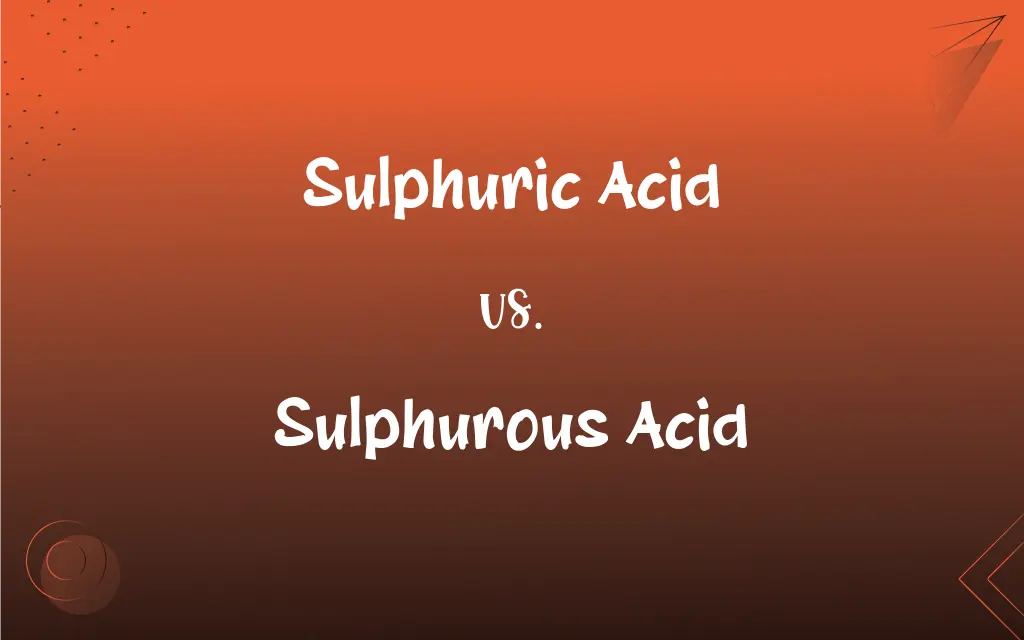Sulphuric Acid vs. Sulphurous Acid: What's the Difference?
By Janet White || Published on August 21, 2024
Sulphuric acid (H2SO4) is a strong acid used in industry; sulphurous acid (H2SO3) is a weaker acid formed from SO2 and water.

Key Differences
Sulphuric acid (H2SO4) is a highly corrosive, dense, oily liquid that is a strong mineral acid used across various industries, including fertilizer production, mineral processing, petroleum refining, and chemical synthesis. Sulphurous acid (H2SO3), on the other hand, is a much weaker acid, less stable, and typically exists in solution or forms when sulfur dioxide (SO2) dissolves in water. While sulphuric acid is known for its dehydrating properties, sulphurous acid is recognized for its role as a reducing agent and its ability to act as a preservative due to its antioxidant properties.
Sulphuric acid is characterized by its ability to donate two protons (H+ ions) in aqueous solution, making it a strong diprotic acid with a high affinity for water. Sulphurous acid, conversely, donates only one proton in solution, classifying it as a weak diprotic acid. The strong nature of sulphuric acid leads to its extensive use in industrial applications, whereas sulphurous acid's mild nature makes it suitable for applications requiring less acidity, such as in food preservation and winemaking.
The production of sulphuric acid is primarily through the contact process, which involves the oxidation of sulfur dioxide to sulfur trioxide (SO3) before its hydration. Sulphurous acid formation is simpler, resulting directly from the dissolution of sulfur dioxide in water. This difference underscores the industrial scale and economic significance of sulphuric acid compared to the more niche applications of sulphurous acid.
Environmental impacts of these acids also differ. Sulphuric acid contributes to acid rain from industrial emissions, leading to significant environmental concerns. Sulphurous acid, while also a component of acid rain, is less stable in the environment, often transforming into sulphuric acid or other sulfate compounds. This transformation underscores the interconnectedness of these two substances within environmental cycles.
The key distinctions between sulphuric and sulphurous acids lie in their strength, stability, production methods, applications, and environmental impacts. Sulphuric acid's robust nature and wide-ranging industrial uses contrast with sulphurous acid's milder, more specific applications and less stable nature.
ADVERTISEMENT
Comparison Chart
Chemical Formula
H2SO4
H2SO3
Acidity
Strong acid
Weak acid
Production Process
Contact process
Dissolution of SO2 in water
Industrial Use
Fertilizer production, petroleum refining
Food preservation, winemaking
Environmental Impact
Contributes to acid rain, soil acidification
Less stable, transforms into sulphates
ADVERTISEMENT
Sulphuric Acid and Sulphurous Acid Definitions
Sulphuric Acid
Accelerates chemical reactions.
Sulphuric acid catalyzes the hydration of alkenes.
Sulphurous Acid
Prevents oxidation in foods.
Sulphurous acid maintains the color of dried fruits.
Sulphuric Acid
Represents a low pH, indicating high acidity.
Sulphuric acid has a pH close to zero.
Sulphurous Acid
Readily dissolves in water to form a weak acid.
Sulphurous acid is formed by dissolving sulfur dioxide in water.
Sulphuric Acid
Removes water from compounds.
Sulphuric acid dehydrates sugar to form carbon.
Sulphurous Acid
Component of acid rain.
Sulphurous acid contributes to the acidity of rainwater.
Sulphuric Acid
The electrolyte in lead-acid batteries.
Sulphuric acid powers car batteries.
Sulphurous Acid
Forms when SO2 dissolves in water.
Sulphurous acid is used as a preservative in food.
Sulphuric Acid
A highly corrosive acid used industrially.
Sulphuric acid is essential in manufacturing fertilizers.
Sulphurous Acid
Donates electrons in reactions.
Sulphurous acid reduces iodine to iodide.
FAQs
How does sulphurous acid form?
By the dissolution of sulfur dioxide gas in water.
What is sulphuric acid?
A strong mineral acid with diverse industrial uses.
What are the main uses of sulphuric acid?
In fertilizer production, petroleum refining, and as a chemical reactant.
What are the uses of sulphurous acid?
As a preservative and antioxidant in food and beverages.
Can sulphuric acid be found in nature?
Yes, in volcanic gases and hot springs, but mainly it's industrially produced.
What is sulphurous acid?
A weak acid formed by dissolving sulfur dioxide in water.
Is sulphuric acid dangerous?
Yes, it's highly corrosive and can cause severe burns.
Is sulphurous acid safe for consumption?
In very low concentrations, it's used in food preservation.
How is sulphuric acid produced?
Mainly through the contact process involving sulfur dioxide oxidation.
What are the health risks of sulphuric acid?
Exposure can lead to skin and eye burns, respiratory harm, and even death.
What is the role of sulphurous acid in the environment?
It's a component of acid rain but less stable compared to sulphuric acid.
How does sulphuric acid affect metals?
It can corrode metals, releasing hydrogen gas in the process.
What precautions are needed when handling sulphuric acid?
Use protective gear and ensure proper ventilation due to its corrosive nature.
How does sulphurous acid become sulphuric acid in the atmosphere?
Sulphurous acid can oxidize to form sulphuric acid, contributing to acid rain.
Can sulphuric acid be neutralized?
Yes, by careful addition to a base, such as sodium hydroxide.
How does sulphurous acid act as a reducing agent?
It donates electrons to other substances in chemical reactions.
Why is sulphuric acid important in batteries?
It acts as the electrolyte in lead-acid batteries, facilitating electrical flow.
What are the environmental impacts of sulphuric acid?
It can lead to acidification of soils and bodies of water, harming ecosystems.
How is sulphurous acid used in winemaking?
It prevents oxidation and bacterial growth, preserving wine quality.
Is sulphurous acid effective in water treatment?
It can be used to remove chlorine and as an antioxidant in water treatment processes.
About Author
Written by
Janet WhiteJanet White has been an esteemed writer and blogger for Difference Wiki. Holding a Master's degree in Science and Medical Journalism from the prestigious Boston University, she has consistently demonstrated her expertise and passion for her field. When she's not immersed in her work, Janet relishes her time exercising, delving into a good book, and cherishing moments with friends and family.






































































